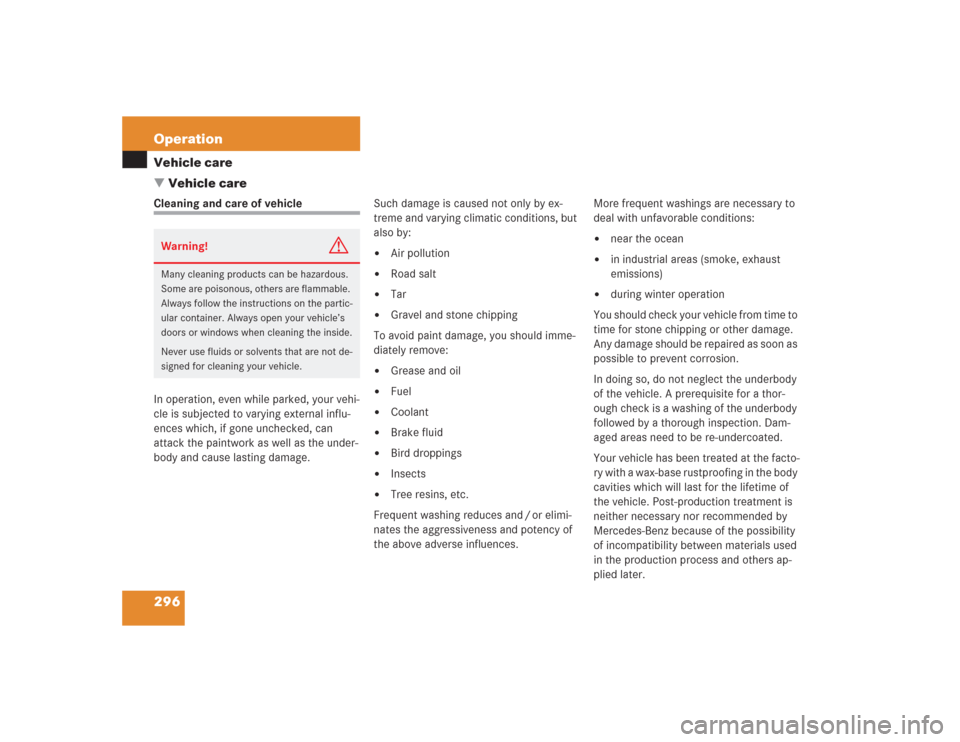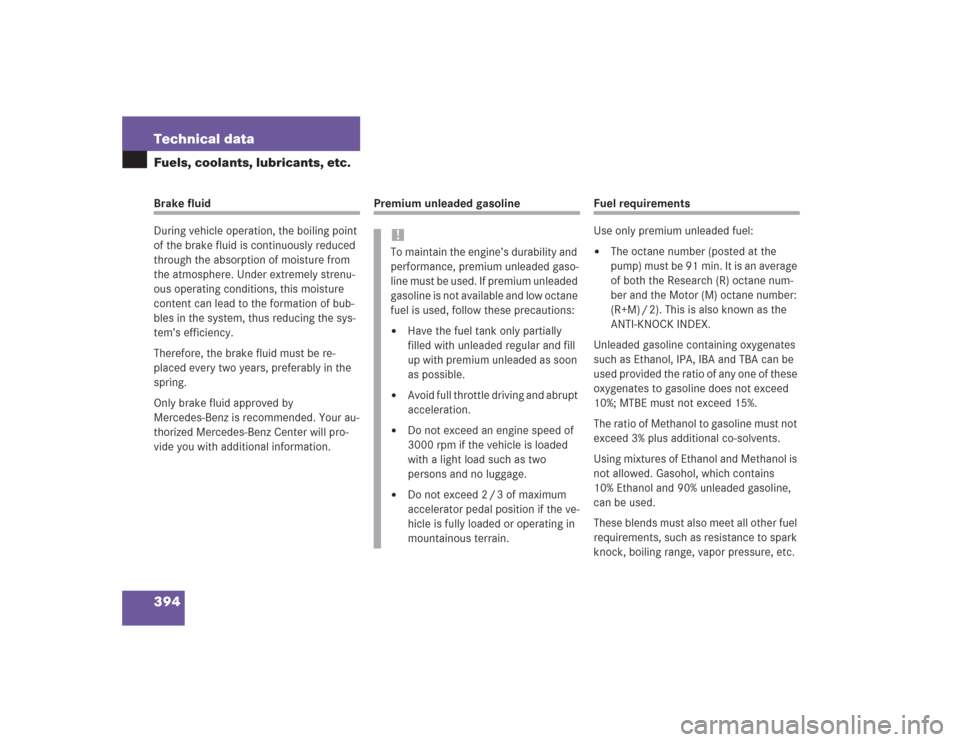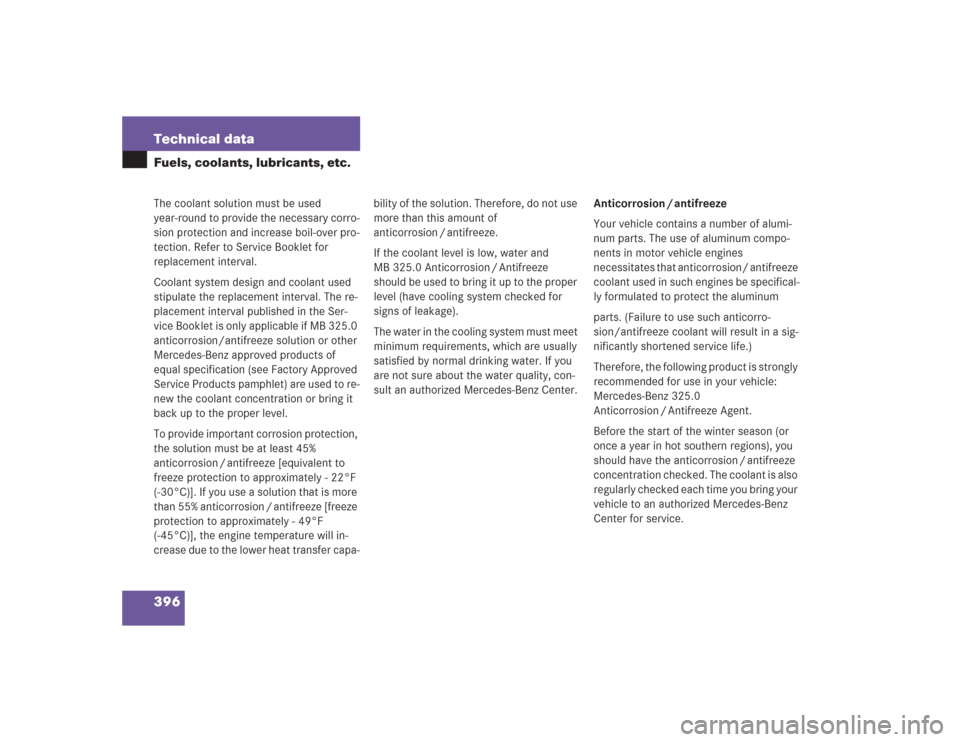Page 297 of 435

296 OperationVehicle care
�Vehicle careCleaning and care of vehicle
In operation, even while parked, your vehi-
cle is subjected to varying external influ-
ences which, if gone unchecked, can
attack the paintwork as well as the under-
body and cause lasting damage.Such damage is caused not only by ex-
treme and varying climatic conditions, but
also by:
�
Air pollution
�
Road salt
�
Tar
�
Gravel and stone chipping
To avoid paint damage, you should imme-
diately remove:
�
Grease and oil
�
Fuel
�
Coolant
�
Brake fluid
�
Bird droppings
�
Insects
�
Tree resins, etc.
Frequent washing reduces and / or elimi-
nates the aggressiveness and potency of
the above adverse influences.More frequent washings are necessary to
deal with unfavorable conditions:
�
near the ocean
�
in industrial areas (smoke, exhaust
emissions)
�
during winter operation
You should check your vehicle from time to
time for stone chipping or other damage.
Any damage should be repaired as soon as
possible to prevent corrosion.
In doing so, do not neglect the underbody
of the vehicle. A prerequisite for a thor-
ough check is a washing of the underbody
followed by a thorough inspection. Dam-
aged areas need to be re-undercoated.
Your vehicle has been treated at the facto-
ry with a wax-base rustproofing in the body
cavities which will last for the lifetime of
the vehicle. Post-production treatment is
neither necessary nor recommended by
Mercedes-Benz because of the possibility
of incompatibility between materials used
in the production process and others ap-
plied later.
Warning!
G
Many cleaning products can be hazardous.
Some are poisonous, others are flammable.
Always follow the instructions on the partic-
ular container. Always open your vehicle’s
doors or windows when cleaning the inside.
Never use fluids or solvents that are not de-
signed for cleaning your vehicle.
Page 395 of 435

394 Technical dataFuels, coolants, lubricants, etc.Brake fluid
During vehicle operation, the boiling point
of the brake fluid is continuously reduced
through the absorption of moisture from
the atmosphere. Under extremely strenu-
ous operating conditions, this moisture
content can lead to the formation of bub-
bles in the system, thus reducing the sys-
tem’s efficiency.
Therefore, the brake fluid must be re-
placed every two years, preferably in the
spring.
Only brake fluid approved by
Mercedes-Benz is recommended. Your au-
thorized Mercedes-Benz Center will pro-
vide you with additional information.
Premium unleaded gasoline
Fuel requirements
Use only premium unleaded fuel:�
The octane number (posted at the
pump) must be 91 min. It is an average
of both the Research (R) octane num-
ber and the Motor (M) octane number:
(R+M) / 2). This is also known as the
ANTI-KNOCK INDEX.
Unleaded gasoline containing oxygenates
such as Ethanol, IPA, IBA and TBA can be
used provided the ratio of any one of these
oxygenates to gasoline does not exceed
10%; MTBE must not exceed 15%.
The ratio of Methanol to gasoline must not
exceed 3% plus additional co-solvents.
Using mixtures of Ethanol and Methanol is
not allowed. Gasohol, which contains
10% Ethanol and 90% unleaded gasoline,
can be used.
These blends must also meet all other fuel
requirements, such as resistance to spark
knock, boiling range, vapor pressure, etc.
!To maintain the engine’s durability and
performance, premium unleaded gaso-
line must be used. If premium unleaded
gasoline is not available and low octane
fuel is used, follow these precautions:�
Have the fuel tank only partially
filled with unleaded regular and fill
up with premium unleaded as soon
as possible.
�
Avoid full throttle driving and abrupt
acceleration.
�
Do not exceed an engine speed of
3000 rpm if the vehicle is loaded
with a light load such as two
persons and no luggage.
�
Do not exceed 2 / 3 of maximum
accelerator pedal position if the ve-
hicle is fully loaded or operating in
mountainous terrain.
Page 397 of 435

396 Technical dataFuels, coolants, lubricants, etc.The coolant solution must be used
year-round to provide the necessary corro-
sion protection and increase boil-over pro-
tection. Refer to Service Booklet for
replacement interval.
Coolant system design and coolant used
stipulate the replacement interval. The re-
placement interval published in the Ser-
vice Booklet is only applicable if MB 325.0
anticorrosion/antifreeze solution or other
Mercedes-Benz approved products of
equal specification (see Factory Approved
Service Products pamphlet) are used to re-
new the coolant concentration or bring it
back up to the proper level.
To provide important corrosion protection,
the solution must be at least 45%
anticorrosion / antifreeze [equivalent to
freeze protection to approximately - 22°F
(-30°C)]. If you use a solution that is more
than 55% anticorrosion / antifreeze [freeze
protection to approximately - 49°F
(-45°C)], the engine temperature will in-
crease due to the lower heat transfer capa-bility of the solution. Therefore, do not use
more than this amount of
anticorrosion / antifreeze.
If the coolant level is low, water and
MB 325.0 Anticorrosion / Antifreeze
should be used to bring it up to the proper
level (have cooling system checked for
signs of leakage).
The water in the cooling system must meet
minimum requirements, which are usually
satisfied by normal drinking water. If you
are not sure about the water quality, con-
sult an authorized Mercedes-Benz Center.Anticorrosion / antifreeze
Your vehicle contains a number of alumi-
num parts. The use of aluminum compo-
nents in motor vehicle engines
necessitates that anticorrosion/ antifreeze
coolant used in such engines be specifical-
ly formulated to protect the aluminum
parts. (Failure to use such anticorro-
sion/antifreeze coolant will result in a sig-
nificantly shortened service life.)
Therefore, the following product is strongly
recommended for use in your vehicle:
Mercedes-Benz 325.0
Anticorrosion / Antifreeze Agent.
Before the start of the winter season (or
once a year in hot southern regions), you
should have the anticorrosion / antifreeze
concentration checked. The coolant is also
regularly checked each time you bring your
vehicle to an authorized Mercedes-Benz
Center for service.